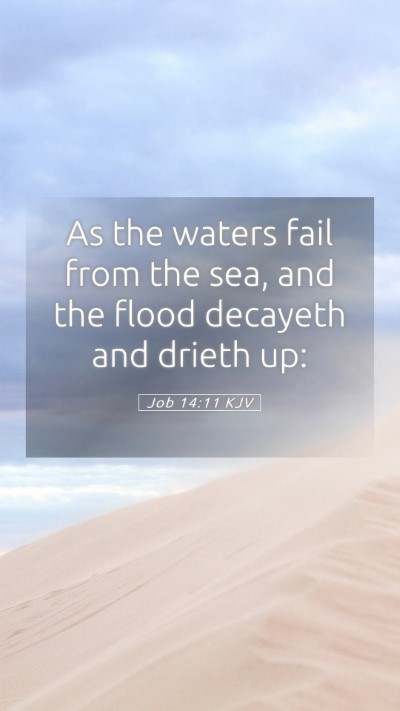Old Testament
Genesis Exodus Leviticus Numbers Deuteronomy Joshua Judges Ruth 1 Samuel 2 Samuel 1 Kings 2 Kings 1 Chronicles 2 Chronicles Ezra Nehemiah Esther Job Psalms Proverbs Ecclesiastes Song of Solomon Isaiah Jeremiah Lamentations Ezekiel Daniel Hosea Joel Amos Obadiah Jonah Micah Nahum Habakkuk Zephaniah Haggai Zechariah MalachiJob 14:11 Meaning
What is the meaning of Job 14:11?
As the waters fail from the sea, and the flood decayeth and drieth up:
Job 14:11 Bible Verse Meaning
Exploring Job 14:11 - A Comprehensive Commentary
Job 14:11 states:
"As the waters fail from the sea, and the flood decayeth and drieth up." (KJV)
This verse metaphorically compares human mortality to the drying up of water, illustrating the inevitability of death and the transient nature of life. Here, we present an in-depth exploration of its significance using insights from respected public domain commentaries.
Meaning of Job 14:11
Job, in his profound mourning and despair, reflects on the fate of humanity as he draws a parallel between the depletion of water from the sea and the mortality of man. This imagery evokes a strong sense of inevitability and the finite nature of life.
Insights from Commentaries
Matthew Henry's Commentary:
Henry highlights that just as water is essential to the sea's existence, so is hope to the human experience. When it's gone, life fades, emphasizing the sorrow of mortality and the hopelessness that Job feels in his suffering.
Albert Barnes' Notes:
Barnes underscores the notion that death, like water disappearing from the sea, is certain and inescapable. The natural cycle of life is such that while it may seem vast and filled with potential, ultimately, every life will face decay and decline. He notes that this verse serves as a somber reminder of humanity’s frail existence and the need to find meaning even amidst suffering.
Adam Clarke's Commentary:
Clarke interprets Job's lamentation as a poignant illustration of despair. By likening human life to the drying up of the sea, Job articulates a deep sense of loss and the pain that accompanies the knowledge of mortality. Clarke also reflects on the spiritual implications of this realization, encouraging readers to consider their own mortal condition and the hope offered through faith.
Key Themes and Reflections
- The Inevitability of Death: Job's sorrow resonates with the universal human experience of recognizing mortality.
- The Nature of Hope: As water is crucial for life, hope is vital for human spirit. Its absence can lead to despair.
- Life's Transience: The imagery of drying waters invites contemplation on the fleeting nature of existence.
- The Spiritual Journey: Death serves as not just an end but a transition, prompting discussions on faith and the hereafter.
Applying Job 14:11 to Daily Life
Understanding Scripture means examining how it applies in practical, contemporary contexts. Here are ways to engage with this verse:
- Reflection on Mortality: Consider how recognizing mortality can inspire you to live more fully and meaningfully.
- Finding Hope in Despair: Seek ways to find hope and purpose in difficult situations through faith and community support.
- Discussing in Bible Study Groups: Use this verse as a starting point for discussions about life, death, and the hope of resurrection.
Related Cross References
- Psalm 103:15-16: Highlights the fleeting nature of life.
- Ecclesiastes 3:1-2: Discusses the seasons of life and the inevitability of time.
- Hebrews 9:27: Addresses the certainty of death for all men.
Conclusion
Job 14:11 serves as a poignant reminder of the fragility of existence, awakening a deep understanding of mortality and the human condition. By exploring this verse through various lenses, we gain valuable Bible study insights that encourage both reflection and discussion. Whether you are part of bible study groups, engaging in online Bible study, or using different bible study tools, the interpretations and meanings drawn from this verse can profoundly enrich your understanding of Scripture.


